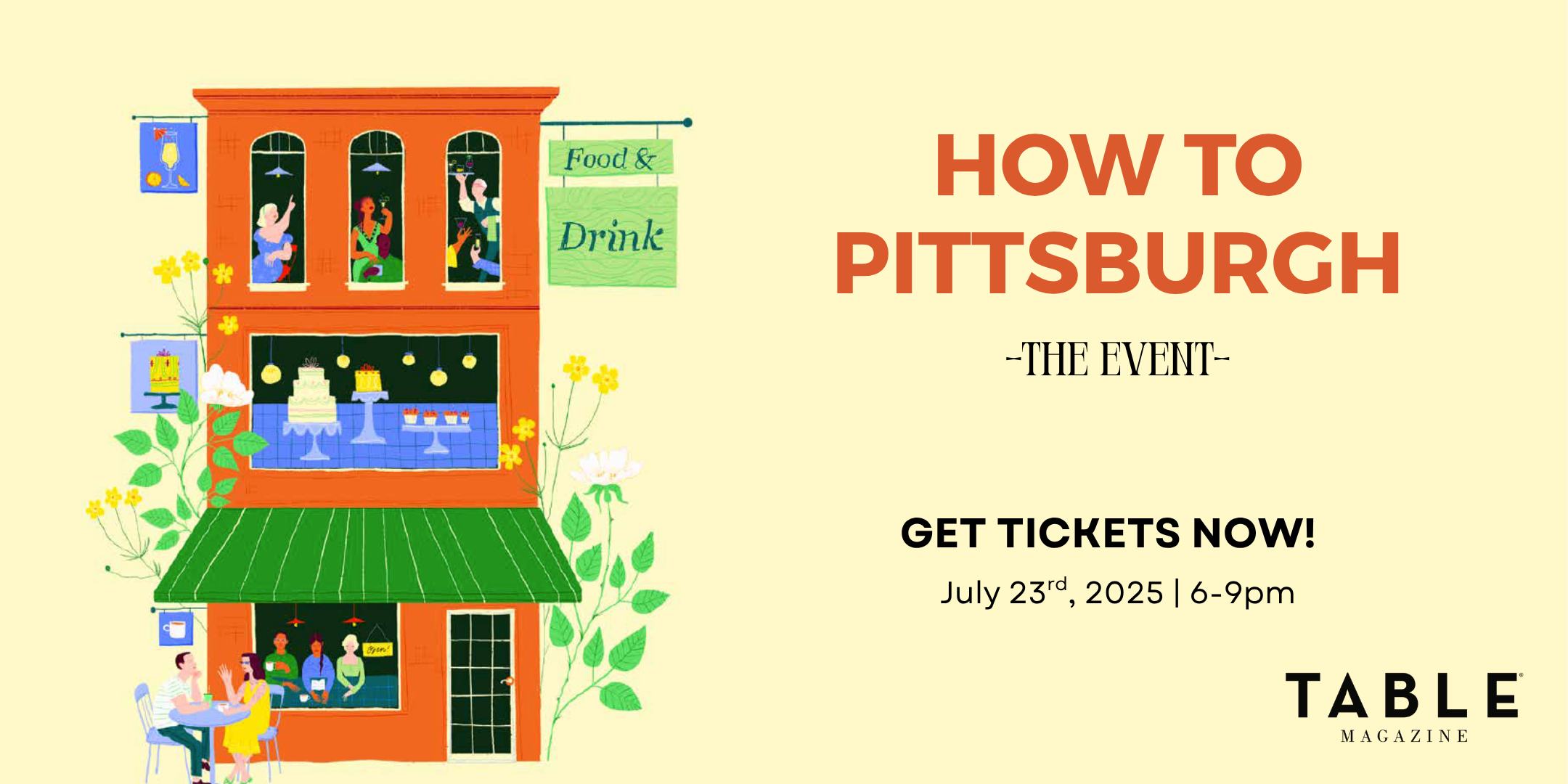An arts-and-culture roundtable opened the doors to understanding what’s working, what’s not, and what’s next in Pittsburgh’s cultural sector.
On a recent afternoon, TABLE Magazine staff members gathered around a long, greenery-adorned table with leaders of Pittsburgh’s arts and culture scene. Dialogue flowed as they sipped mocktails and tucked into lunchtime creations by Chef Kevin Hermann.
Editor-in-Chief Keith Recker opened up the conversation by expressing that we, as readers and consumers, want to learn how to savor this city’s culture not only as the “dessert” of life here — but as the “main course.” He set the stage for hearing how all of these institutions are faring as we emerge from the pandemic, capturing what’s needed next and learning ways we can all offer support.
A lively, two-hour conversation ensued on how to make the arts accessible and sustainable for each entity’s audience—and the collective community, too. The several newcomers of the group shared a similar first impression: Pittsburgh is an unusually collaborative city, with frequent and generous exchanges and mutually supportive actions. This rare trait certainly is not something to take for granted.
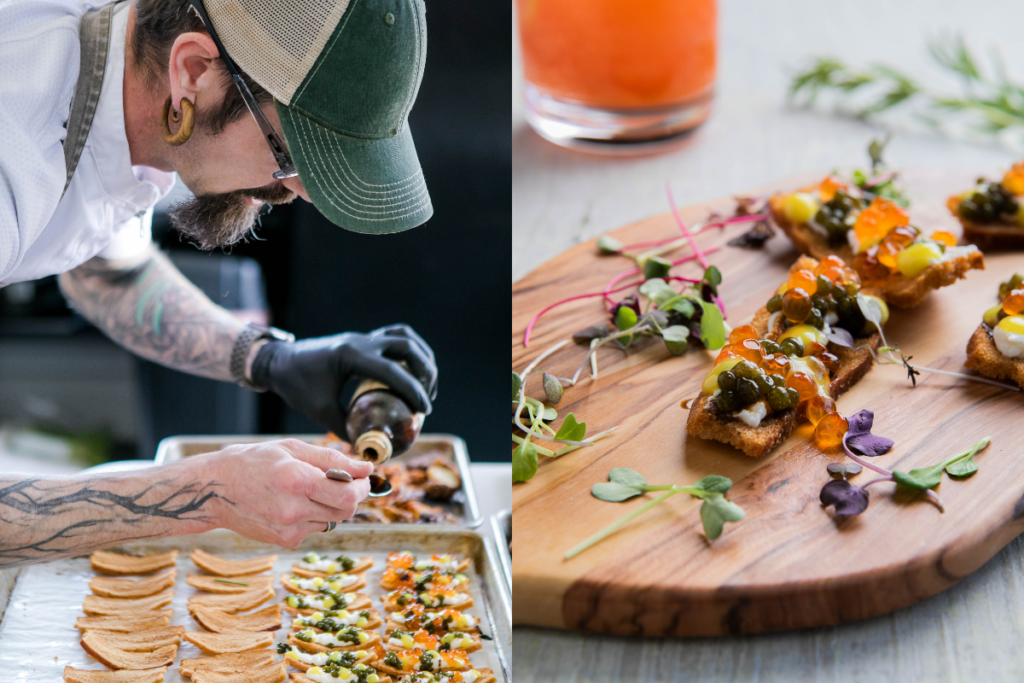
Chef Kevin Hermann whips up lunchtime creations.
A Collaborative Spirit
The conversation began with what’s working in this resilient town full of vibrant personalities. Christopher Hahn, who’s been here 23 years, praised how Pittsburgh, “against all odds, seems to have such a depth of variety of the arts and culture.” This surprises those who come in from outside (initially even himself, he admitted).
He commended the industry’s ability to cross-fertilize, have conversations, and act as a collaborative. Leaders frequently show up at one another’s performances to show support. “The general public is as unaware of the specialness of this amazing tapestry as people from outside are,” he said.
Patrick Moore observed how Pittsburghers’ fervent hometown pride can be a double-edged sword. While folks seem to recognize their city’s abundant cultural scene, most don’t make it a regular part of life. A “next week” attendance mentality often wins out, with many saving cultural outings only for special occasions or out-of-town guests. “It’s not always enough to just be proud of something,” he says. “You have to actually participate in it.”
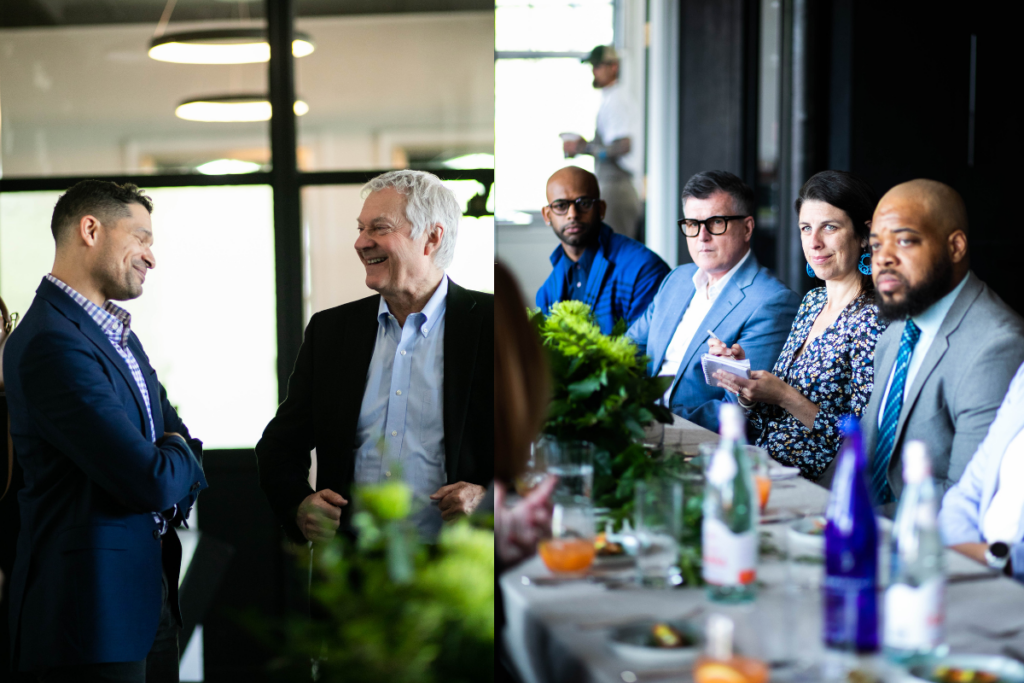
From left to right: Adam W. McKinney and Christopher Hahn. Joseph Hall, Patrick Moore, Corinne Whiting, and A. Orlando Watson.
Pandemic Recovery
Most agreed that the city’s mutual support system has been incredibly helpful in getting through COVID and its lingering economic implications. Concerns about perceived safety downtown have proven a challenge, too. Thankfully, many feel encouraged by constructive steps being taken by Mayor Ed Gainey and new Police Chief Larry Scirotto. Kendra Ingram, who arrived earlier this year, has already seen progress in the city’s response to safety as well as caring for folks in crisis (whether dealing with addiction or mental health issues).
Melia Tourangeau admitted that last fall was a precarious time for the Cultural District, since so many workers no longer commute to offices. This means the public must make an active choice to mobilize toward city activities. While Friday used to be the symphony’s best attendance day, Sunday matinees now have the best showing. Yet Tourangeau remains hopeful. PSO has seen a 200% subscription increase for next year.
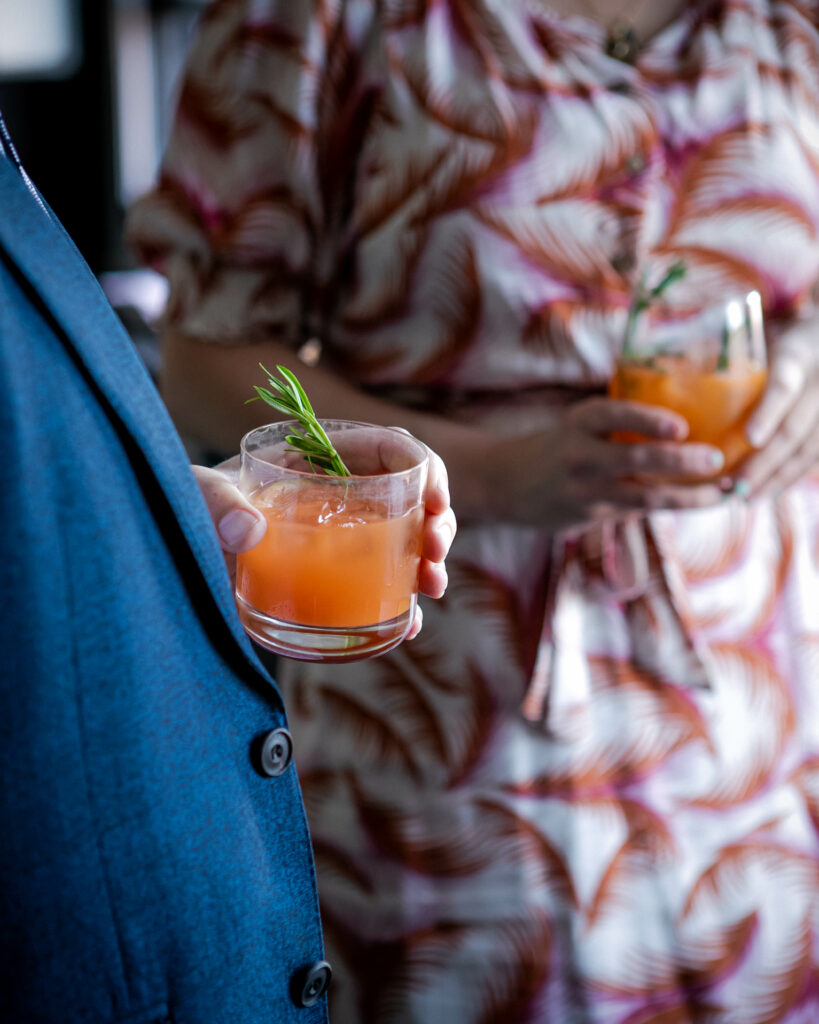
Mocktails: a fun beverage to sip while keeping the mind clear.
A Rising Tide
Garfield Lemonius sees a renewed ease in collaborating with others, too. Perhaps, he suggested, this is since folks were isolated throughout the pandemic, and now crave interaction. Similarly, Erin Perry praised the imaginations that surfaced during the pandemic to keep the arts in motion, like the Hotline Ring — a virtual fundraiser (held in both 2020 and 2021) involving seven organizations. Since then, many participants have maintained relationships, revealing the possibilities that emerge when like-minded people unite.
“The things that we were able to do blow my mind,” she said, “We can literally create what we want.” In deciding what experiences we’re all interested in curating, she added, we can transform people’s lives. This happens on a personal level — and then has a ripple effect out into the world.
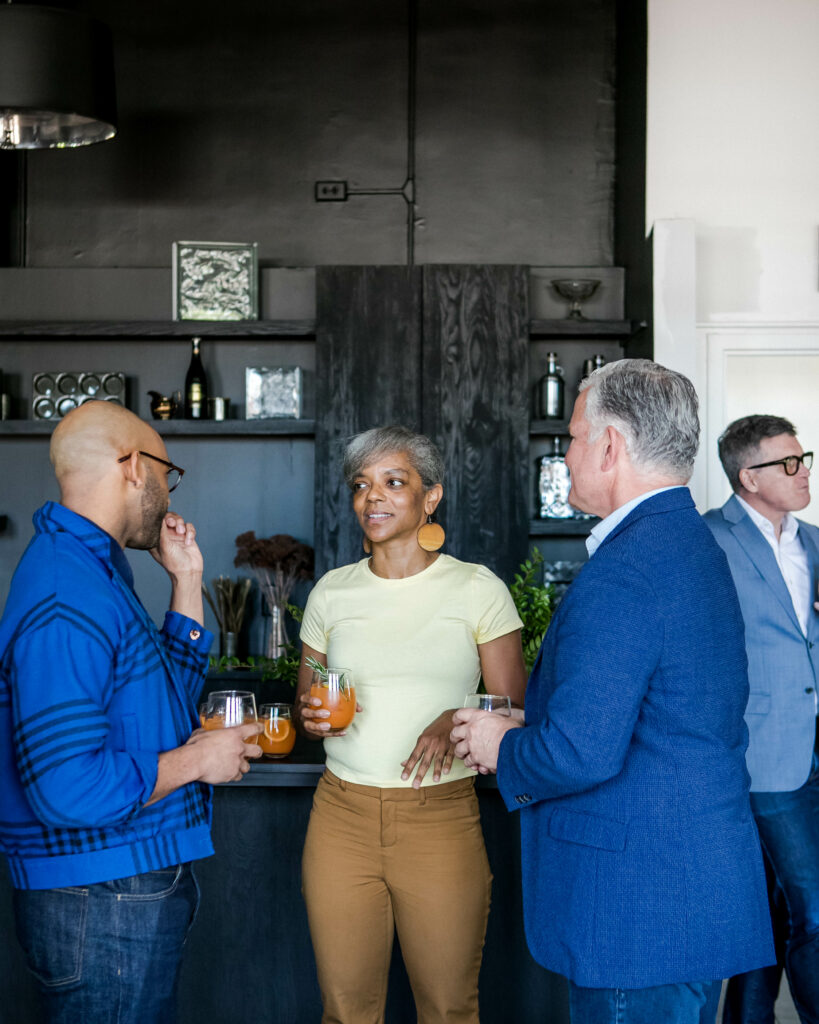
From left to right: Joseph Hall, Erin Perry, Keith Recker, and Patrick Moore.
Perry, whose Homewood-based organization focuses on arts of the African diaspora, expressed great gratitude to join the discussion since she knew only one person sitting at the table prior to the session. While focusing on the saying, “The rising tide lifts all boats,” she noted how entities like hers often work in a bubble. This can be exhilarating, but means they can only grow so much. “The notion of collaboration for me is something that is vital,” she said. “It’s vital to our community.”
She noted the importance of letting folks know that while things are happening downtown, things are also happening in neighborhoods like Homewood, where her organization acts as a community anchor. “It brings a vitality and it brings a vibrance that otherwise we’d just be seeing this violence and decay on a consistent basis,” she said. “But what we’re able to do in community, and as we collaborate with other folks, to say this is the network that exists, this is the ecosystem.” Bringing groups out of isolation enables everyone to have access, so that all communities can thrive.
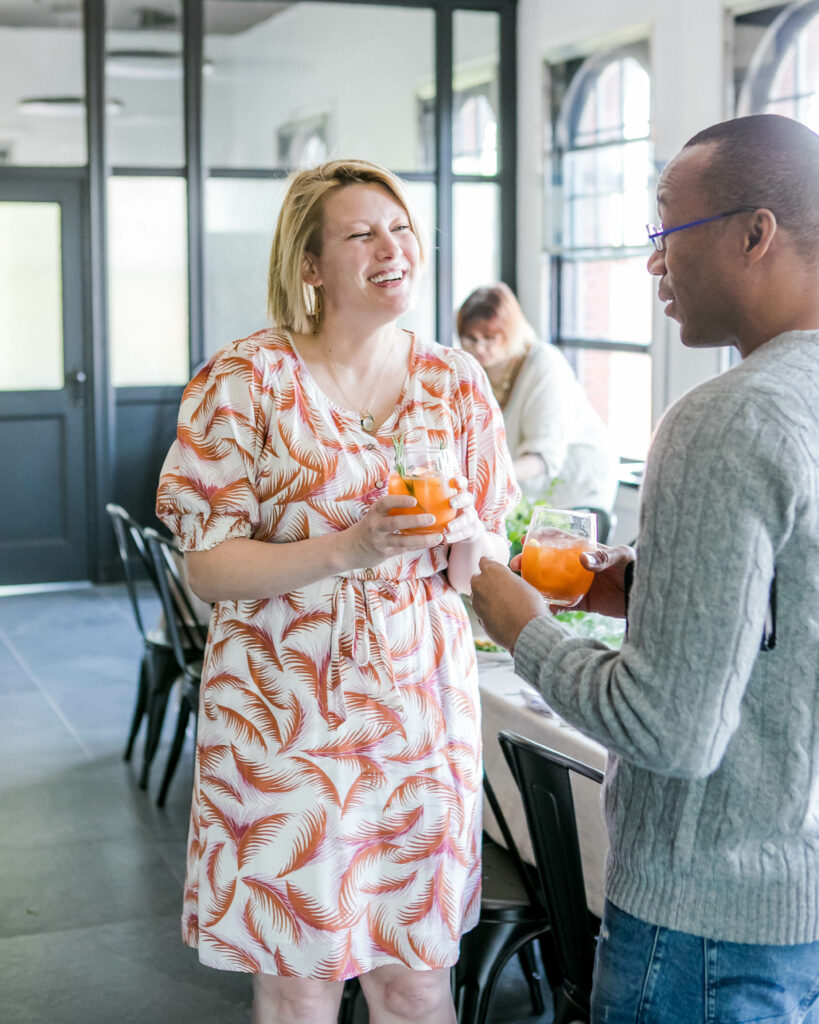
Dr. Kati Gigler and Garfield Lemonius
Promoting Education and Access
On the education piece, Dr. Kati Gigler spoke about PBT’s focus on getting more arts into the schools and during after-school hours, too. Engagement in the arts needs to be woven into other aspects of life and follow kids home as part of their greater life experience as well. Lemonius also emphasizes that his students must experience art in the community, beyond the campus.
Many talked about the idea of “welcome” — ensuring that the arts are not only special-occasion outings, but something we do as people of Pittsburgh. Much like Gigler was fortunate to do as a youngster here, she wants everyone to be able to say, “I grew up with the arts.”
It’s important to consider the topic of class, and finding a way for the arts to feel inclusive and accessible to all who express interest. Adam McKinney, who’s also new to the Pittsburgh scene, talked about the opportunity to work toward the demystification of the arts, and “to highlight function as much as we do form.” From his industry’s perspective, it’s important to ask, “What can ballet do, other than what ballet is?” He added the importance of “reevaluating why we do what we do, to think about creating action toward function.”
Moore shared that, at The Andy Warhol Museum, they’re increasingly interested in the question: “What is our value proposition to the city?” Not only do they want to train future curators, but they also want to teach skills transferable outside of their own “rather narrow industry.” The aim is to host programs for kids that ensure they don’t have to “be the next Warhol who moves away to New York City” in order to pursue a desired career.
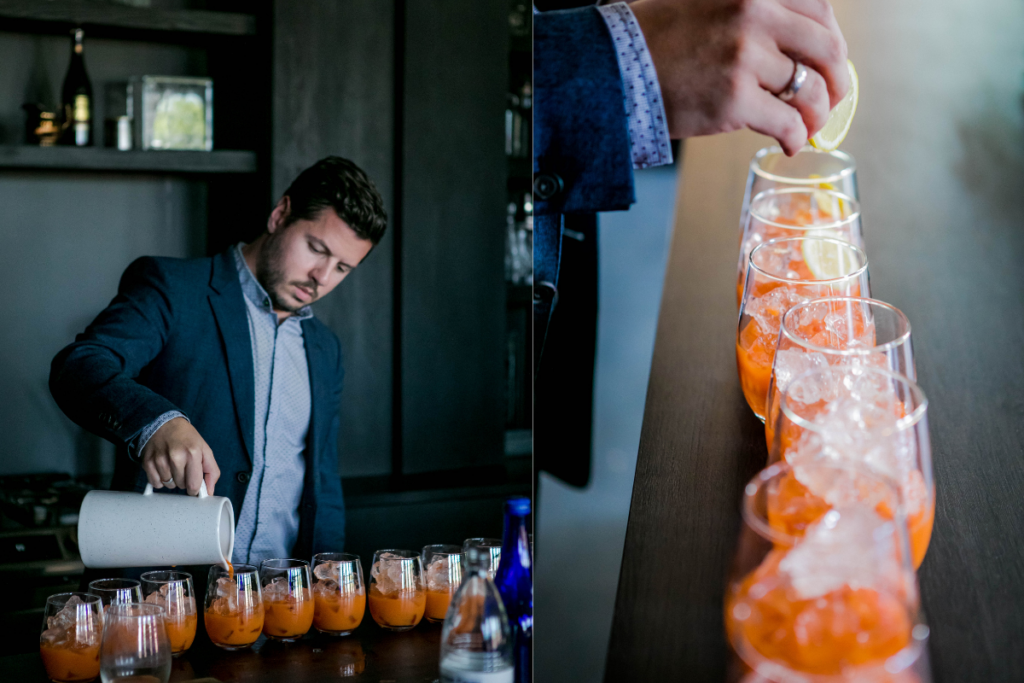
Justin Matase mixes up mocktails.
A Sense of Belonging
Ingram agreed that when defining arts and culture, we can get caught up in the classical canon. She sees the power in “getting out of our own way around what culture is.” Others agreed it’s crucial to create a friendly and non-intimidating environment that welcomes all.
Around the question of opening access to the next generation, it quickly became apparent these folks aren’t stuck in their thinking. Most seem aware that, in order to connect with the next wave, they must examine popular platforms already in use. Joseph Hall pointed out the example of TikTok, where uber-popular dance reels are a clear indication that people consume dance all the time. It’s crucial to ask: “How are we meeting folks where they already are?” he asked. He also spoke about considering what may interest young audiences, so that they can create bridges in ways that are digestible. (The symphony’s Disrupt series, which upends the typical concert experience, was offered as an example.)
Many from this group also want to break down barriers to let people in attendance know they can participate, even with their own voices. In his curtain speeches, Hall likes to tell folks it’s a call-and-response theater, saying, “You can shout, you can sing, you can get up and dance.” He adds, “I think especially for younger audiences, and Black audiences, that’s what we expect.” Saying this aloud offers permission, and lets audience members know they are there as witnesses and participants.

Parmesan-Chive Gnocchi: Spring Peas, Radish, Parmesan, Basil, Olive oil
Encouraging Engagement
Hall sees an opportunity to continue challenging ourselves, especially in how this city defines culture. From his perspective, folks want to engage in experiences beyond the performances; it’s also about the post-drink meal or drink during which they can debrief about what they just watched and felt.
Making people feel a part of the process — and presenting artists on display as “regular people” — feels important too. A. Orlando Watson, an artist who has toured himself, talked about August Wilson Center programming that focuses on increasing engagement, from hosting meet-and-greets and Q&A sessions. He noted the magic that materializes “when you take down the barrier to the artists and allow them to be tangible, real people offstage.” At one time, he pointed out, it was much harder to touch artists. The pandemic created a transition in which followers are really invited to be part of the conversation. “I realize people really want to be included,” he said.

A Whipped Ricotta appetizer: Speckled Caviar, Balsamic, Olive oil
Looking Ahead
Although no one at the table brought up the topic of resources until encouraged by Recker, Tourangeau pointed out that, like most everywhere, their expenses are up and revenue is down. “Philanthropy is critical,” she said. Simply selling tickets isn’t enough.
And all seemed to agree with Hall’s excitement at shaping the narrative of contemporary Pittsburgh, right now. “We’ve told the story of steel and Steelers,” he says. “There’s an opportunity to create the path forward — collectively.”
Roundtable participants also concurred that, in order for this mutual exchange to thrive, the public has a responsibility to remain curious and engaged. In other words: For all of this to work, people have to show up.

Melia Tourangeau
Toward the end of the gathering, Gigler reiterated one simple call to action for readers: “Go. Don’t wait until next season. Take advantage of what you have now.”
In a follow-up email, participants exchanged contact information and expressed gratitude for the opportunity to converse and dream up future collaborations. Through the fresh lens of a Pittsburgh newcomer, Watson shared a heartfelt observation: “Please do not take yesterday’s meeting for granted because it does not happen everywhere — at all. I love the unity and open conversation, which makes me eager to collaborate with all of you!”
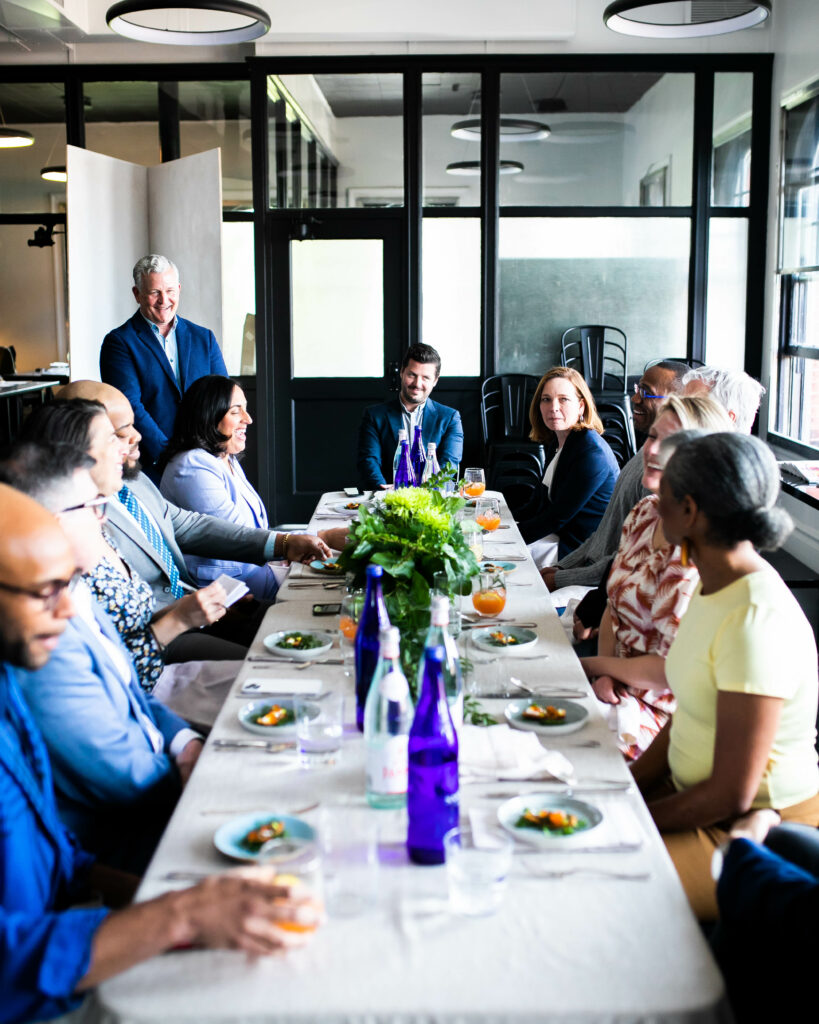
Who’s at the Table
Kendra Ingram, CEO
Pittsburgh Cultural Trust
Dr. Kati Gigler, Acting Executive Director
Adam McKinney, Artistic Director
Pittsburgh Ballet Theatre
A. Orlando Watson, Senior Director Programming
August Wilson African American Cultural Center
Christopher Hahn, General Director
Pittsburgh Opera
Erin Perry, Executive Director
Legacy Arts Project
Patrick Moore, Director
The Andy Warhol Museum
Garfield Lemonius, Dean & Artistic Director, COPA Professor
Point Park University
Joseph Hall, Executive Director
Kelly Strayhorn Theater
Melia Tourangeau, President & CEO
Pittsburgh Symphony Orchestra
Justin Matase, Publisher
Keith Recker, Editor-in-Chief
TABLE Magazine
Story by Corinne Whiting / Photography by Laura Petrilla / Food by Chef Kevin Hermann
Subscribe to TABLE Magazine’s print edition.

